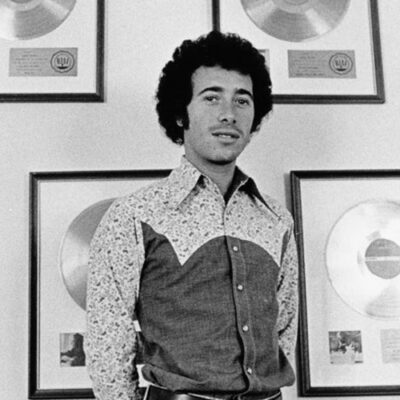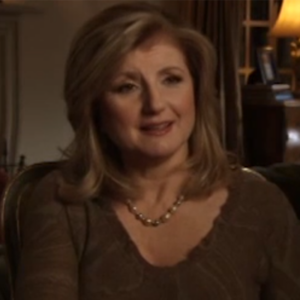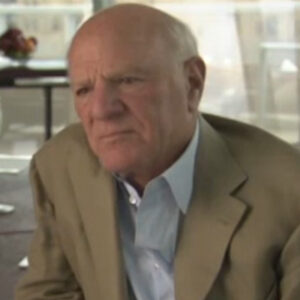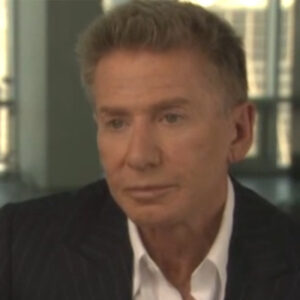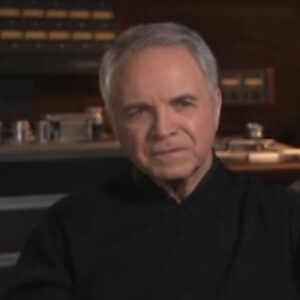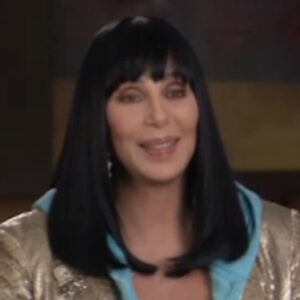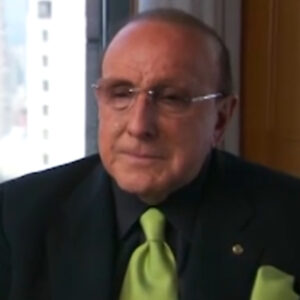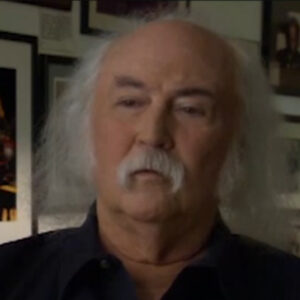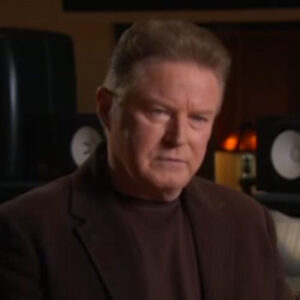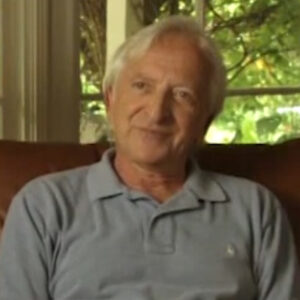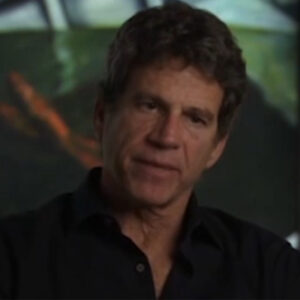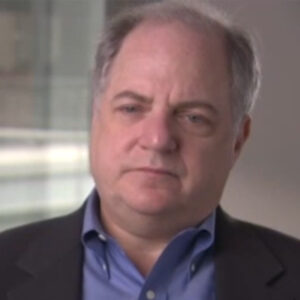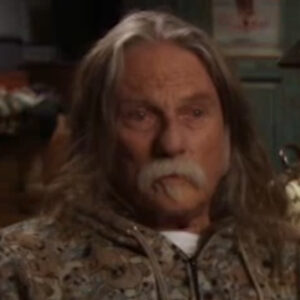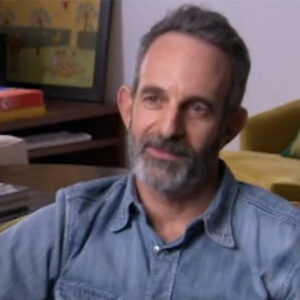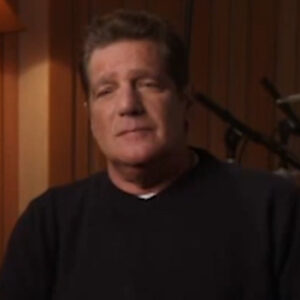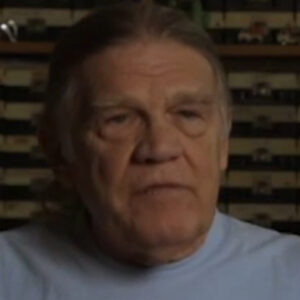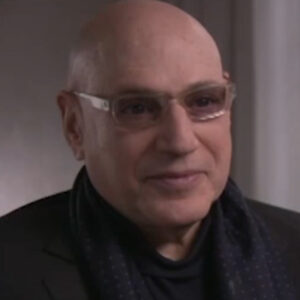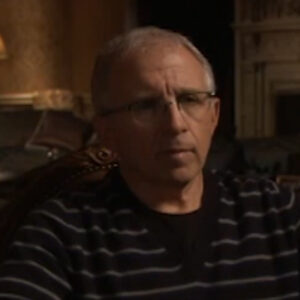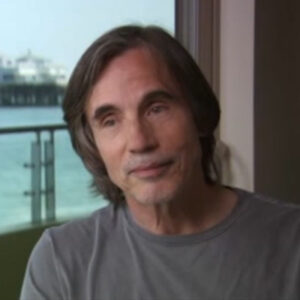Speaker My father was a longshoreman, was born in Brooklyn, got my first job in the record business through a woman named Ellie Greenwich. It was a great songwriter who actually died recently, died about a month and a half ago. And I started in a recording studio with Phil Ramone. And I was an assistant engineer and got fired from that job. And he got me another job at the record plant. And I was lucky. I was sort of, you know, getting T- and answering the phones and cleaning up, but learning. And the owner of the studio was very, very nice to me and it wasn’t nice to me, but he liked me and he was like a football coach. And he got me in a sessions with John Lennon. And John adopted me as his engineer. And a very I was 20 years old and I traveled to California and stayed out here with him for about four or five months for the Rock and Roll album. So that was kind of like my first album that I did at 20.
Speaker And actually that’s what that picture is from, from that album and hearing something.
Speaker Yeah, I think it’s the jacket banging against.
Speaker I could fix that chair. Yeah, I was there. Not on purpose. All right.
Speaker So so you were 20 years old and you were planning.
Speaker Yeah, I was 20 years old. And then after that, John retired in 1975.
Speaker And because he had Sean and I went to John’s house with him and Yoko and because I was we were going to start another album and he said, no, I’m retiring. And Yoko’s read some book. You know, it was open a book with all these dates and everything and, you know, and they just settled Apple. That’s the real reason they just gotten the money, which they didn’t have from 71 to 74.
Speaker And so then right after that, I met John Landsdown, Bruce Springsteen, and I did Born to Run. So I had nothing to do after John stopped working 75. So I did that. And that really worked out. And I met really important guy guys in my life, which are Bruce and John. And that’s how I met David, because John introduced me to David Wright and I think was 78, 79, right around darkness. All right. After.
Speaker Well, you know, I already thought of I really had an impression of Dave because, John, you talk about him all the time because John was producing Jackson Browne. And, you know, it really I came from New York and I was in the punk scene and the rock scene and they were making records very differently than we were. They were making records that were very dry without Echo. And we were making very loud trashy noise records in New York. So it was a very different thing. But there was this this guy, David Geffen, you know, everybody knew about, you know, Ellie Greenwich knew about, I mean, all the people that I was going to meet. And actually when I met him, no, I met him once before that. I was an engineer on the on the on the Rock and Roll album. And he came by with Phil Spector. Phil was the engineer who was a producer, and I was the engineer. And the strange night it was it was David was a share. And Phil sort of I don’t know what he was jealous. David, you know, and Phil took some kind of karate stance or something like that. And because what happened was Phil was insulting Cher all the time. Cher was singing. It came back one night with David, came with her.
Speaker And that’s the first day I met David. I remember like it was yesterday, you know, recording studios, a small estate two feet from me. I said, this is David Geffen and he’s dating Cher at that point.
Speaker Yeah, I was dating Cher and I didn’t know him. I just but I knew I meant that Phil attacked him. It was so awful. I also had a gun strapped to his chest. You know, this guy was, you know, to me was nuts. You know, it was like, oh, God, you know, visiting a recording studio. So David, you know, didn’t do anything and just kind of left, you know. You know, it was very David now that I know him and it was a weird night. It was just but that’s the first time I met him. And then John introduced me to him.
Speaker I didn’t know you were there. Now I don’t know. You know, sorry, I we should of you, Yoko, which was a really difficult interview.
Speaker I mean, because obviously, David Yoko at the time, it was just yeah, it wasn’t the worst possible time. But she had said, you know, John had already known David, you know, because they had met in California. And yeah, I never really heard the story the night that David tells it that then they went and were in someone’s house, like in a hot tub or something and hung out all night party or something was out of his house.
Speaker Could have been Richard Peristyle.
Speaker Throughout white interview, Lou Adler also, by the way. Oh, you did great. Oh, he was great.
Speaker I mean, he and he really he was great because he kind of set up kind of where California was.
Speaker Yeah. You know, he’s the guy. Yeah, sure. Sure. Yeah, yeah.
Speaker So let’s just backtrack for one second. Although that that’s a fantasy. I had no idea that you guys had limited. And just go back to Brooklyn for one sec. Yeah. We kind of past uh, you know, what is it is over in the water in Brooklyn.
Speaker I mean, why is everybody so Jerry Moss is from Brooklyn. I think most from Brooklyn governments, you know, I mean, most sort of you know, I think I was born in San Francisco on a mountain or something, but he wasn’t allowed to be missing from Brooklyn. But he is. I’m kidding. I’m not sure he does. It’s just working class families. No way out. You know, entertainment is a way out short of, you know, if you if you want someone who can go to school. And you know, what David and I share was that thing about school. It and it wasn’t great. You know, it wasn’t great for me anyway. And so in those days, either you are a laborer or you find a way out through sports or something, you know, you know, and so like and so we, you know, got into music, you know, that was one way out, you know, and the Beatles had a lot to do with that inspiring it.
Speaker And but when I I’m sorry, I just when I do something, you’re right. I don’t need to just take it. I’m just having so much fun. I mean, you know. Hey, guys.
Speaker And so, you know, the way out is, you know, for people that are really inspired, really want to do something, you know, you find a way, I find a way, a lower level job, like, you know, David was an agent or whatever. And I most of the guys I know started I started recording studio, whatever version of it. It’s all the same story pretty much. And then you you work your ass off and try to get, you know, try to get somewhere, you know, and it’s always models in front of you. You know, I had David to look at as a kid, but I was also a record producer. So I came from a different I came from the creative side, although David’s very creative, I came from purely the creative side.
Speaker I never thought of starting a record company. I was that’s what I always look back on. David said, how come he knew that? How can he knew to start the record company rather than make all the hit records for somebody else? You know?
Speaker I mean, do you think David ever had that? I mean, obviously, Dave’s very creative guy. I mean, he’s a really creative guy. And in fact, you know, one of the one of the great clubs, you know, for our film is Warren Beatty was a very close friend of David when he introduced him in 92 with this event. David, actually, where David came out officially, he said David is captain of industry with the soul of an artist.
Speaker Right. But it’s so true. I mean, David is really a creative guy.
Speaker They see what David has that the rest of us don’t have is a lot of people are really talented.
Speaker You know, it’s it’s hard to get to the top of your industry or to be the biggest actor or the biggest director or anything like that. It’s really, really hard. You have a lot of respect for all those people. What David can do is for some reason, he can apply it to other things. This is not a guy that goes around buying companies and then puts managers in. He applies it to music. He applied it to film. He applied it to Broadway. He applied to art. He plays the stock market. And he’s as good at all of those things as he was in music. But he’s applying the same type of talent. He’s not just acquiring. And he really understands the art. He really gets it. You know, he understands the plays and he understands Wall Street. He understand understands all of it. So not everyone can apply it to five or six things. That’s really a miracle. That’s really a very, very, very unique thing. Even had the technology today can’t apply it to other things they do.
Speaker That one trick, you know, I have one trick, you know, and I thank God, you know, I have that one trick. But David has multiple tricks.
Speaker I mean, what do you just, like, born that way? And what is it?
Speaker I don’t know. Yeah. Yeah, he’s got whatever in his upbringing is, whatever it is, his brain works like that, you know, is the shortest distance between any two points. David’s brain, you know, just ask him a question. I, I mean, he’s been incredible with me because I’m ten years younger than him, you know, and I’ve just since nineteen eighty. He’s always been really helpful with me. Just ask him a question and like he helped put my Interscope deal together and then he.
Speaker Michelle, it is universal, you know, so the big, big things in my life in front of the greatest friend, I mean, I could honestly say that I may be the only person in this interview that can say that, but I’ve done nothing for him in 29 years and he’s only done stuff for me. I can’t think of one thing.
Speaker Maybe interview a friend of his son for a summer job or something, you know, but other than that, nothing he’s only done for me.
Speaker Big things, big, big things. And the biggest of all is education and mentoring and teaching and, you know, and being being straight, you know.
Speaker So it’s really like that. My relationship with him is really, really like that. We have lunch, you know, every two or three some days, you know, whatever it’s like that, you know, and, you know, go on the boat. And I’m one of the one of the 12 apostles or whatever it is, I go on the boat and everything is always 12 apostles on the boat.
Speaker And but that’s really the truth about him. He’s really generous with his friends and has been with me, you know, I mean, it’s been incredible. There was never no, I guess I was never any competition.
Speaker Like even when we had both had record companies was nothing. You know, every sold Geffen Interscope started. So we competed with them, you know, but was never really never a problem. Well, you were kind of a different person, Mark. And I said, yeah, yeah, yeah, we were. We were. But also, you know, I stay clear of it, you know, I mean, it was because he is my friend, you know.
Speaker My God, you know, I didn’t see you never had one of those famous bloods, but they were like we had a little a little argument, you know, it was real. But again, again, it was my fault.
Speaker I hired one of his guys, you know what I mean? I one of his guys and he asked me not to. And I did. And it was absolutely I just thought of the record company. So I didn’t know I was very naive. And I it was stupid. It was really stupid.
Speaker Yeah. They call you up.
Speaker Yeah. Oh yeah.
Speaker They call me. We can speak for a couple of weeks and then we got together and that’s the only thing I could ever think of that was ever like that.
Speaker We we interviewed Irving Azoff. I’m going to ask you about that later. But he said I never said I in the early days, you know, when he worked for David and.
Speaker Yeah, I never witnessed such verbal verbal lashings as as a demon kid who said, you know, he said that I learned from that, you know, I mean, obviously everybody has that reputation to be a screamer. Different.
Speaker Not your style. No. Just different from David Irving. Yeah, yeah.
Speaker Yeah. Not I don’t work with him, but different than Irving.
Speaker Um, so that was all fantastic.
Speaker What you just said and what it made me think of is that I mean, I don’t know if this is really part of this movie or not, but, you know, people like, you know, when David started out, you know, he had these amazing mentors. You know, he had it exactly right. And he had, what, Clag early on and then he had some rocky times. But you know, Steve Ross. Oh, yeah.
Speaker And that’s how I learned it.
Speaker I learned that you need a mentor from David.
Speaker So I just I just watched him and I said, this is, you know, and I was very, very smart. John Landauer brought a lot to me and taught me a lot about this. And that’s why he introduced me to David. He said, you need to meet David because he could really help you, you know, like you and, you know, and and we really hit it off. And it was great. It’s been a practically thirty year relationship. You know, it seems like everybody is talking to us 30 or 40.
Speaker Something relevant was that it says that, A, everyone keeps them in their lives, you know? I don’t know a lot of people. I don’t have a lot of friends for 30 years.
Speaker You know, he seems to have an awful lot, you know. Well, you know, he’s talking to 100 people for the show. I mean, if you’re doing my show, it would take about an hour or so and line them up with that.
Speaker So.
Speaker So there’s a lot of questions, so let’s see.
Speaker So 19, so here you are, it’s nineteen seventy five and you’re and you’re not to away from John Lennon.
Speaker I didn’t want around with Bruce. Right.
Speaker 1975, but during that time, I mean, David was living in New York because he had kind of like a health scare and he was living there but I didn’t meet to eighty seventy nine a.m..
Speaker We’re still getting all my ring. Sorry.
Speaker So you met David, so. Yeah, maybe you met him in California briefly. Yeah. Was that recording studio at A&M and that’s where the album was done.
Speaker Phil Spector. John Lennon and I just met him not one day and then I met him in 79, 80, 78 right before.
Speaker Right. What about Geffen Records was starting Geffen start in eighty. Right.
Speaker Late 70s. You know, he was partying in New York. No, no, no, no, no, no, no. So you met up with him and then you been out and he’s been sort of out of the loop, you know, during those years, almost parallel to Lennon and those years.
Speaker Yeah, it’s very, very yes. Because how long was Geffen Records before John died?
Speaker Not six months, right? I mean, not at all. You know, nothing. And I was one of the things I was to ask Geffen. I mean, very sad. I mean, Geffen was nowhere. You know, he made these deals with these really big stars, put out a lot of money, you know, for some early deals because he felt he needs some punch for the label. Right. And then, you know, Double Fantasy was really would put him on the map. Right. So it was kind of a sad thing that that’s how it ended up, you know?
Speaker Yeah. Then the album took off. The label took off and around eighty five. Right. With Guns and Roses. Yeah.
Speaker That’s I really took off but so you know, so David had been sort of out of the loop for a few years and then here he comes back and starts another label with Warner.
Speaker Right.
Speaker I what was the, what were the people in the industry thinking.
Speaker Were they thinking like everybody was now? I mean the the smart people knew, you know, that you don’t bet against a guy like that. Everybody I mean, the people I talked to, I was I was a hot record producer at the time. You know, I was doing Stevie Nicks and Tom Petty and Bob Seger and, you know, Patti Smith. And so I met him one of those circumstances where he had a label and I was a record producer. So, you know, that’s a certain type of relationship. The record companies usually if a guy is really good, they’re nice to them. Right. So he was going to be nice to me anyway because people wanted me to make records for them. So but he we just sort of had a friendship, you know, we really did.
Speaker And just he just kind of helped me right through it. And then ten years after that, I started Interscope.
Speaker Now, Geffen, you know, as sort of like a model for an independent label, whatever. I mean, can you sort of talk about Geffen Records and what what sort of was the trajectory of Geffen Records? Were you watching that?
Speaker Yeah, of course. Of course.
Speaker Well well, David, what we did was he structured it. See, David, I think, start to feel at that time that he wasn’t it wasn’t the music that he loved that was going to go. So he figured he needed people to channel that to him.
Speaker So he hired an our people and experimented with different guys. Then he had a great day in our team and he and he had these three or four guys and he had and but.
Speaker Yeah, David, you say something to me, OK? Sure. John Kalodner, Gary Gurche and Tom Sitel. And there was a girl.
Speaker I’m Sarah Cal child. Right. Cal child thinking about you. Oh, yeah. Yeah. So send me a Christmas card every year, you know, and she’s Jewish girl, so, you know, she’s a great girl, Carol. I mean, Carol, you know, very classic 19 sort of 60s record girl, high strung.
Speaker You know, the they just wants to get it done in a man’s world in those days, you know, now it’s different.
Speaker But that was Carol. You know, it’s really fantastic. A great girl. And so he structured it like that.
Speaker And that was the beginning of him saying it’s not I don’t do this.
Speaker I’m the business guy. I’m just the force, you know?
Speaker But it really was never true because he always had feel and sense and taste, because that’s all they ever talk about. All I ever did, you know, and I would talk for hours. I you know, he loves music, you know what I mean?
Speaker I mean, it doesn’t mean that he loves, you know, mid 80s rock, you know, but you need somebody to bring that into the company. But no one can close like the record business is about finding somebody and you gotta close it. You got to get them to come to your label.
Speaker They got to come to your label instead of going to Clive Davis. They’re going to Ahmet Ertegun instead of going to me, instead of going to Moe Austin, instead of going to Doug Morris at Atlantic, instead of going to all of those labels, you got to make them want to come to you. And you have a small label with no Rasta, no all you have, as you can. I did that.
Speaker I had all these and our guys, but they have to wheelmen to close it because I had the history of being in the recorded music and I produced, you know, it’s like that’s all you’ve got, you’ve got that and a shovel. And so that’s what he did. I he closed and he managed the company and he you know, he could tell which one was which and when the company’s wasting the time when they’re not wasting their time, because these guys are full of everything, everything they sign, everything I oh. Is the greatest thing in the world. Know personally, it’s there. They identify with it.
Speaker It becomes them, you know, the wife and the kids, you know, and and the guys that are running the company, in Geffen’s case, Geffen, David Geffen, you have to you have to run all of it. You can’t let anybody run free like that. I mean, David’s company was not a democracy, you know, just wasn’t, you know, and mine isn’t, you know, partner.
Speaker I had a partner. Had a partner. Yeah.
Speaker But still wasn’t a democracy, you know.
Speaker I mean, the tone of it ran the tone of it is the way I wanted to run it, you know.
Speaker And I learned that from David. You know, I watched David do it. I said, OK, this is how this is how it’s done. It’s really simple. You know, I was going to meetings with him because I was producing, you know, and and did you ever play in anything?
Speaker And I always played music. I mean, like, you see that I mean, he is the type of person like what he was you know, what he would say now in those days, what he would say is, I don’t know, but I’m not the guy to ask.
Speaker But it was always that the I learned what I one of the things I learned for him from him is the least amount of credit you take. The fewer people call you. And that’s a good thing or else everybody has to talk to you. So I really learned that from him. So I learned it wasn’t me. You know, so he’s big at that, and I didn’t do that, he did it. And in the end, everybody knows the truth. That’s the real truth. You know, if if you’re if you’re like that, everybody knows the truth, you know? But I learned that from him. And I use it all the time. I still use it. I still use it just. Because otherwise, everyone’s calling you for everything and it’s really you don’t get to be you you don’t get to create, you don’t get to do anything you can really do. All you’re doing is, you know, cleaning up after the elephants, you know.
Speaker So I mean, so do you think I mean, so David, I mean, demonises distinctive style, you know. No doubt. Yeah. He’s incredibly charismatic.
Speaker I mean, what do you mean charismatic? He’s direct. I always say I mean, I’ve heard somebody told me this. He’s the shortest distance between any two points.
Speaker Like, if you want to get from here to there, he knows the surest way to do that in anything. Your house, when I when my wife and I bought bought our first house, architect, designer, you know, interior designer, everything. Doctors. Every doctor I have, I got from David from when I was about twenty seven years old, 30 years old, every doctor go to this doctor. No, no, no, no, no. Go to that doctor. Go to this doctor is the interior decorator. That’s the person. This one does the gardening. It’s like it’s so it makes life so much easier. It really does.
Speaker It’s always cold, but it’s I mean, I assume everybody does that. I do it, you know, I did it yesterday, you know, I did call them up and say, look, you know, I’m talking I’m doing my new contract, this. And he’ll say, time’s on your side. Just don’t sign it. The longer you sign the one, you take the sign and the more you’ll get stuck. By the way, it’s a funny thing when you can actually believe that in someone, it makes life much simpler. You know, I just it’s a very loud voice in my head, and it always has been, you know, especially in the last.
Speaker 15 years, it really has been you know, it’s just been really, really, really helpful to a lot of personal things and a lot of business things. And I keep trying to remember the thing that I did for him. And it just never kind of comes up. You know, it’s I mean, maybe I entertain him. I don’t know, maybe he likes me because I detain him. I don’t know. But everybody says that Dave is a lot of fun to be around. Oh, it’s incredible. It’s incredible. He’s so smart. You know, that’s what everybody says. You know, he’s so smart, you know, and and he gets it. He gets it about everything. And I tell you, it’s very different. Most of the guys that have done things in multiple areas, you know, whether it’s cable, having a cable and doing television or and doing records and doing they they hire people to do it. David, the things that he does, he does. He understands, he knows it and he does it. You know, whether it’s politics, art, music, you know, movies, plays, real estate, houses, whatever he does, he does. That’s different than somebody becoming the CEO, you know, like from the cookie business and moving into the film business, you know, and because he’s a manager, it’s different. It’s a very it’s a it’s a very, very unique thing that he does that I. I know I don’t know why it was never written, but it’s so unique because I know a lot of these guys. I mean, I don’t know if Bill Gates had run a music company or, you know, or anything there.
Speaker I mean, maybe he could run, you know, he’s a brilliant guy, you know what I mean? But I don’t know if he can go. And David doesn’t run the companies.
Speaker He just you know, he created all he created his own art market, you know? I mean, he spotted it. So I moved on it. And then the business of it, it’s like he just like the art and put it is has to go. That’s great art. David, you know, he created a market sold at exactly the right time, timed it, but also appreciated it. You know, he understands and he knows why. It’s great.
Speaker And that’s a big thing that’s that’s incredible.
Speaker I can like something and collect them and not do that if people are following through and know who to call about, how to get the right price for the painting and he doesn’t have an agent out there doing that for me is doing it.
Speaker He’s doing it.
Speaker Well, I don’t know. But how did you find where did you get the bandwidth? How does he know it? How does he know that? How do you have those two sides of your brain going that effectively?
Speaker That’s not easy. It’s genius. If you know, if anybody I’ve ever met, you know, two guys take out, I don’t know about musicians, you know what I mean? But the two guys that I know that stunned me the most with their instinct and their talent, David Geffen and Steve Jobs. And I got to be really good friends with Steve, those two guys. You know. When the you know, when the dust settles.
Speaker Their names will be somewhere, you know, because they both had actually actually they have similar things and a lot of ways, you know, they’re both tough. You know, but they they get the scent, the art side and the business side. It’s very rare. It’s very rare. But David’s not because David does it in whatever he wants to do with it, whatever he’s interested in, if he can get interested in it, he can conquer it. I mean, Wall Street, why is he interested in that? But he called it he told everybody to get out of the stock market. And he, of course, think it’s crazy if you start that. I would just say David told everybody David told everyone to get out of the stock market. I would say early late 2006, early 2007.
Speaker And his instincts. A very primal, very primal, and because he understands it, if he gets interested in it, it’s instinctive to him. That’s the difference. What I do in music is instinctive to me. Haven’t done anything else. I’m mortal.
Speaker You know, I can’t. I just can’t. I don’t have it in something else. And it isn’t like I don’t I couldn’t collect art or I couldn’t like certain kinds of art. That’s not what he’s doing. He collects it, loves it, feels it builds the market for it finds the buyer sells it times it. I mean, yeah, maybe somebody can do that and art but you can’t put them in a recording studio. They could walk into a recording studio today and say, you know what, that doesn’t feel right. You know something wrong with that. He wouldn’t do it. And then he says he can’t do it, but he can do it. You don’t find that. You know, if he’s interested, he can conquer. And he’s interested in a lot of things, what I just think it really hits him, I think it hits him like it’s Michaelangelo’s, you know what I mean? I think it just hits him and he just want to feel that it goes, OK, that’s it. Politics right now in my life, politics right now. I mean, he’s always collected art, but right now I’m going to do this thing. I see this like I see how big it can be.
Speaker I think I think David I think David looks at things and says, what can it be rather than what it is. You know, we all look at things and say, oh, that’s what it is.
Speaker He looks at thing and says, what can that be?
Speaker And that’s a conversation at lunch. If you’re talking to him about something, he’ll say, no, it could be this. You could do this. You should do that. He’s not looking at it like, OK, really? Oh, is that what you do? Oh, that’s OK. That’s interesting. He’ll say, no, this is what you’re doing. This is why you’re telling me this. You’re telling me this because of that, you know, it’s like so and then he’ll say, you’re underachieving. You’re not seeing a clearly this is the way he’ll give advice to a lot of different people. But the big thing are those to me are those two things is how many areas he’s done it in.
Speaker And how it hits him instinctively and why he picks those certain things, politics has nothing. I mean, Wall Street has nothing to do with what I do. So I built a very big record company. So did he. I didn’t call the market on a building. I didn’t make those deals that he did. I didn’t have Broadway plays. I didn’t I go down the list of things that David has done, you know, that I haven’t done so. He and I really believe it hits him like an artist, that’s when Warren said that. Is because it hits them like that, I watch it, it isn’t calculated, it really isn’t. It’s it’s just he feels it at any given moment.
Speaker He feels that and he does it.
Speaker You know, oh, OK, great, sometimes when you’re there and around, David, you realize, you get you realize that you were in the middle of something that’s going to be written about 100 years from now. Look back on as the time when, you know, like they look back on, you know, the Kennedys, you know, at that time or, you know, Gatsby or any of that stuff. You look back on Randolph Hearst, you look you know that you’re part of something happening that’s going to be talked about for a very long time.
Speaker But what’s the story with the boat? Is it like the most incredible thing I’ve ever seen?
Speaker Yeah. I mean, like, what do you see in.
Speaker Well, it’s it’s a great boat ride. It’s one of the greatest boats in the world. Right. But also the way David does things are very gracious, not over-the-top, very smooth, very casual, you know.
Speaker No.
Speaker So you go there and, you know, you spend a week or two weeks or whatever, and it’s always interesting people and it’s very relaxed and it’s very cool, you know, you don’t do business on the boat. You know, you kind of just like I go kayaking in the morning and I go to the gym and hang out and have lunch and I’ll go somewhere and do something. And it’s very it’s really the greatest thing. But you also know that you can feel like you’re part of something that’s bigger than what’s actually really going on or more special, not bigger is more special.
Speaker Who I mean, who’s the coolest, most interesting person that you didn’t expect to meet on the boat?
Speaker Well, there’s a lot of categories. There’s beautiful, there’s interesting, as smart as powerful. There’s all those different categories you know so well out of your world.
Speaker Out of my world, I would say Tony Blair, Queen Rania.
Speaker I would say those two of Jordan, Queen Rania, Queen Rania of Jordan.
Speaker It has to be really, really, yeah, hanging out, having lunch with the queen and yeah, they’re they’re incredible people, you know, and and that’s that’s what I would say.
Speaker I would say that was maybe less interesting.
Speaker Yeah. No, that’s yeah. It gets bored quickly. Very quickly. Very quickly.
Speaker You should see him doing these interviews. I can only tell you I thought I could only imagine. But yeah.
Speaker I mean, that’s the thing about David is like he he can go from this to this to this to this today, you know, quickly. But it seems that the boat, you know, which is what’s is sort of like a salon or something, like people go there and they talk and they, you know, and it’s like the intermingling of many different worlds, you know, in this really special isolated place.
Speaker Yeah, well, it’s the way he does it.
Speaker He runs his houses like that. It’s very clean. It’s very straight. It’s very simple. But yet it’s very complicated. At the same time. There’s a lot going on behind the scenes. Yeah, but he just is a great manager, was his first job and it’s really well he’s great and he’s a great manager and.
Speaker So what about this?
Speaker I mean, I guess you’ve been quoted as saying that you, uh, you follow the artist, I mean, that, you know, you’re all about being artist centric. Yeah. You know, that that that, you know, you never try to second guess what? You let the artist be who they are developing. David seems to have started that way with asylum.
Speaker I don’t know if it had that reputation, but just islanded asylum really had the reputation. It was it was very like minded artist. It was really it was designers line, you know, asylum records, you know, you know, Joni Mitchell, Jackson Browne, the Eagles.
Speaker And it was really it was that California thing, you know, and it was incredible. Music is still incredible. You know, it very much fashioned after he just took it and designed it. Did it. You was very, very, very David.
Speaker And do you think I mean, was that something you saw? I mean, were you was that.
Speaker I saw that from New York. I just saw it. And I said, well, that’s interesting. You know, I filed it, you know, because it was in a funny way, it was slightly more like Motown than it was like other record companies at the time. It didn’t dabble. It had certain it had a feel, had a static, you know.
Speaker Well, you know, David. But the management company, I mean. Yeah, well, that sort of Motown actually. Yeah, yeah, yeah. They control all that stuff. But I always say, well you see a management company.
Speaker Yeah. They were together like Motown.
Speaker Yeah. Well, you know, David, that was one of the first people I saw that, you know, about putting, you know, the management and the and the publishing and the label, you know, all together. And and but from where I look at it from a musical perspective, I hear things I don’t really see them.
Speaker You know, it’s like that’s that’s a that’s a visual thing.
Speaker You know, it’s the music is what got me that had a certain feel like Motown. So that’s kind of whereas Lanark had a lot of different kinds of music. And Columbia, it was just a hodgepodge of stuff that asylum like you knew what you were going to get when you bought the record. And that’s really hard to do. I mean, Motown had that not many labels that had that, you know, not many labels around that.
Speaker These silent sound.
Speaker Yeah, I feel it was a culture. Yeah, it was. It was that California culture. You know, it was is incredible.
Speaker Anything that was all David’s instincts. You love that music.
Speaker And therefore, I think that’s the way you instinctively at the best feel of music. That was his thing. He loves that music. I mean, I don’t know if he still loves it. I think he knows but loves Laura Nyro.
Speaker Yeah. Did you know? No, no. I just love going there. You know what he had done with Laura? No, no, no, no. Pretty amazing story.
Speaker I really like that he kind of rescued her and turned it around and, you know, made a star out of her essentially.
Speaker And I think, oh, OK. Yeah, OK. I don’t know if what you can say about this, but what I you know, when we interviewed Irving the other day, he said, you know, during the 80s, you know, when David was running Geffen and Walter Yetnikoff was running.
Speaker Yeah, yeah, yeah.
Speaker And Irving was running NCEA, there was kind of a big rivalry going on between the three of and they were trading barbs in the press and this and that. I mean, you know, what was this all about? It was just drama. Is it just the highs and lows? I mean, what was going on?
Speaker No, I got nothing to say about Serena, by the way.
Speaker I said earlier, you know what, with this all this yelling on the phone and yelling at each other, you said, yeah, when I do it now, I can’t go in 70s.
Speaker Right. I went 70s on it. I thought it was pretty funny. Yeah.
Speaker So, I mean, if David retired.
Speaker No.
Speaker Now, absolutely not. Not if I have any say about it. I talk too much. I’m I’m dying to get him back in the record business. You know, I talk to him all the time about it. I mean, I always come up with an idea for him to do it. You know, I always tell him, you don’t you don’t have to run it. I’ll run it, you know? And I’m always wanted to do it.
Speaker Can you start a record company?
Speaker No, no, no, no. You buy one. You can buy one.
Speaker You can buy one. Those describe it.
Speaker I mean, was there something about when David started? There was a combination of incredible smarts, obviously, and timing and stuff, but also just amazing timing. I mean, that time. Yeah. You guys talk about a little bit versus today.
Speaker Well, you know, the 90s were good timing as well. You know, the CD explosion in the 80s. You know, but a lot of people had record companies that didn’t do that. It doesn’t matter if it’s good times are bad times if you’re doing the better than everyone else. You’re the guy or the girl or whatever. So whether it be the 80s or the 70s, I mean, you know, with the key thing, people pay more money for record companies like Jerry Moss of his in the 80s, a lot of these guys sold around the CD explosion, you know, around when CD really took off and, you know, and the industry just catapulted.
Speaker So, you know, Jerry Marsella, Chris Blackwell. So David Geffen sold.
Speaker A lot of companies were sold in the 80s and today there’s no explosion. I mean, today it’s you know, the business is going through a gigantic transformation and it’s gotten whacked.
Speaker And it’s really the whole piracy thing is terrible.
Speaker And but I see I see a bright future, you know, I really do. I think that is the thing that with a universal Sony is doing this thing. Vevo is really a powerful thing, this YouTube thing. And, you know, it’s just a matter of looking at the business in a different way. You know, I think we have some challenges in front of us. I don’t know if we have the people that can fix it. I really don’t.
Speaker I mean, there’s this whole new, like, 360 deal thing, and that’s a.
Speaker My husband, Rand, not Rand Hoffman, Ron Levin says that, you know, that the business now is like you have to see the challenges as like a new opportunity.
Speaker You know, it’s going to go in a new direction and you don’t really know what it is. But if you’re up for it and you’re not resistant to change, you know, you can something great can happen there.
Speaker There are a lot of people in the recording industry that can’t move it forward either in the jobs there and there’s no question about it. So things are going to change or maybe will change about how long it takes, about how long the wrong people stay in those jobs.
Speaker Yeah, I know, and who owns the company? So I think the companies have to sell that little shake up.
Speaker OK, two more questions. One, we asked this of everybody. Three words to describe again.
Speaker OK, I’m sure. Ask me that first three words. This is three words to explain. David Geffen. OK, was second question. We’ll figure it out.
Speaker Well, kind of to the go side to side by side one is what is David’s overall impact on the music business? Just kind of a bird’s eye view of what he kind of contributed because, you know, he’s pretty much out of the music business. And then the other one, which is what do you think his proudest accomplishments are?
Speaker Well, David Davis contributes to the record business is I can look at through my own eyes. You know, I hear a certain type of entrepreneurial spirit, a combination of tough yet feel for music and really set the tone for how to build an independent record company, but yet monetize it and make something out of it and have it have a legacy and how to build it. He I would say that’s one of his biggest contributions to it and how to do business, how to do business in the record business, how to, you know, be able to get tough business to walk around in. You know, the other one was what was his proudest in his press conference.
Speaker And, you know, I think he’s very proud of it. And you talked about music or life, whatever.
Speaker I think I think the proudest accomplishment he has is that he’s gotten his life to a point where he’s happy right now. I would say that that’s his proudest accomplishment.
Speaker And that statement about how to do business, we have to and it’s all right, let’s get around it.
Speaker Yeah, I mean, he’s happy. He’s in a relationship. He seems happy now.
Speaker Yeah, that’s that’s I think when I look at him, right, I when I talk to him, I say what I say. I said in the last 10 years, this is because all the other things run into each other. The are the movies, the records. They’re all kind of the same thing. You know, one’s harder than the other. They’re all kind of the same thing.
Speaker It’s generating money and things you’re interested in and.
Speaker But how much happier he is in the last ten years?
Speaker It’s got to be his greatest accomplishment in my eyes. It’s a person who’s worked on himself. Yeah, it’s very inspiring. I mean, I’ve done the same stuff. It’s I tell you, he’s ten years older than me, so I just say, OK, I watch it.
Speaker Three words.
Speaker Oh, um, funny ones.
Speaker But, um, could you two versions. You could do whatever. No. No.
Speaker I would say.
Speaker Is hard, tough.
Speaker And kind.

